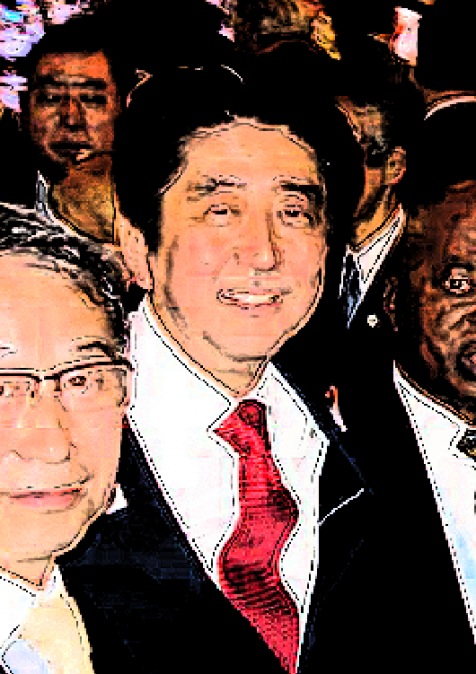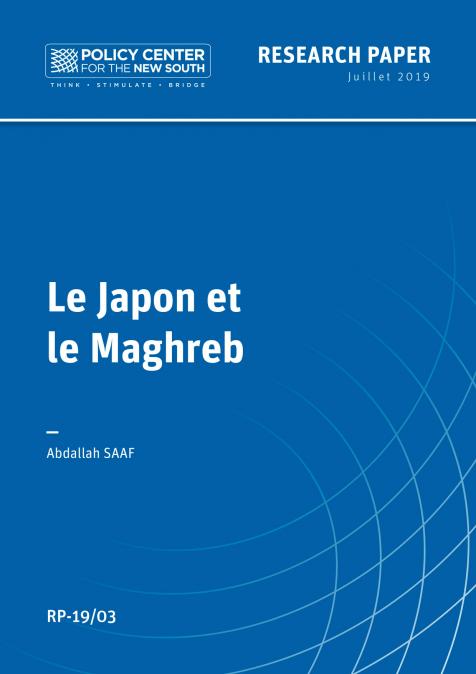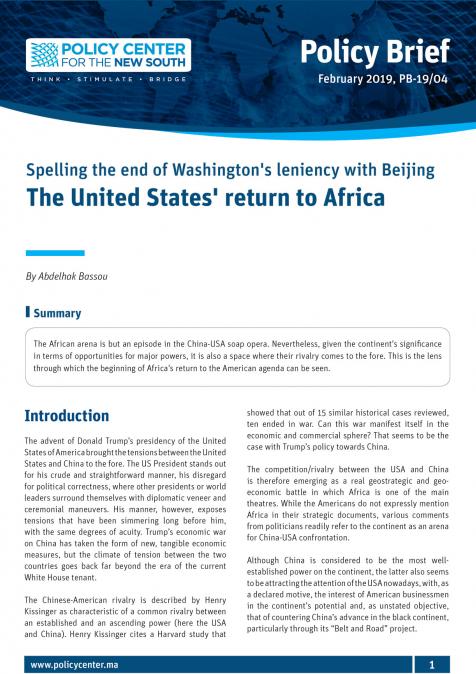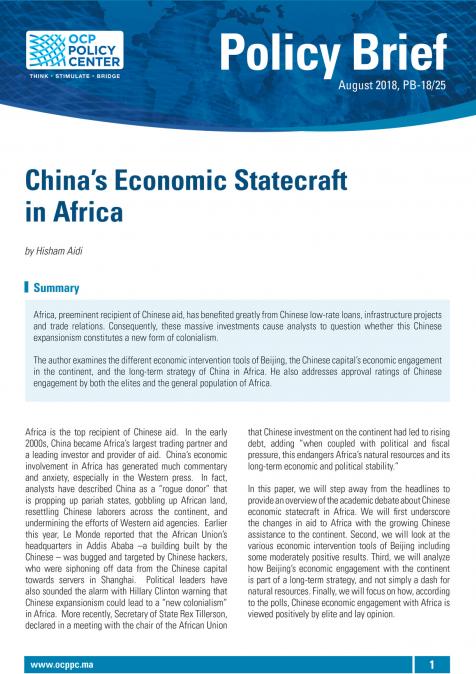Publications /
Opinion
Amid a heated election battle for the re-election of the Japanese Senate, Japanese leader Shinzo Abe was assassinated in a dramatic way that caused great shock and disbelief in the Japanese public opinion.

Dr. El Mostafa Rezrazi with PM Shinzo Abe at the Summit of the 5th Edition of TICAD held in Yokohama in June 2013
After his health deteriorated, the man voluntarily left office in 2020, but his party’s comrades persuaded him to give them more support in the election campaign. On Friday the 8th of July, Abe was killed by a lone gunman while giving a campaign speech in Nara.
Two days after this horrible assassination, the Japanese went to the polls on Sunday July 10 to renew half of the upper house of the Japanese Parliament (Senate), for which the ruling Liberal Democratic Party (LDP/ Jiminto) was the favorite.
Voters went to vote, carrying with them their burning questions about the reasons for this violent scene that significantly marred the country’s political mood. Many Japanese decided to go to the vote in victory for democracy, and others were performing their electoral duty as a rite of mourning, while supporters of Abe’s party went to express their respect to the murdered man.
Fumio Kishida’s ruling coalition (formed of the ruling LDP and its partners Komeito, as well as the Democratic Party for the People (DPP) and Nippon Ishin no Kai (Japan Innovation Party) won a landslide victory in elections for Japan’s upper house, presenting the government with a historic opportunity to revise the country’s pacifist constitution after the assassination of Shinzo Abe boosted voter turnout Now the coalition holds 179 seats of the total 248-seats in the upper chamber of parliament.
Who killed the leader?
But the Land of the Rising Sun is still wondering about the motivations of the assassin, criminal or terrorist? Yamagami Tetsuya, who is accused of shooting Abe, is 41 years old. He served with the Maritime Self-Defense Force for two years and nine months through 2005 at the Kure base in Hiroshima Prefecture Yamagami informed the police that he held a grudge against a religious group and that he targeted the former Prime minister because he believed Abe was closely linked to it. Yamagami explained that he committed his act because his mother, a member of this group, went bankrupt due to her many donations and contributions to the group’s activities.
The Family Federation for World Peace and Unification has confirmed that the killer's mother has been a member of the group since 1998; nonetheless, it denied any connection with the perpetrator. For its part, the Unification Church’s relationship with the assassinated Prime minister, and through the person of Tomihiro Tanaka, head of the Japan branch of the Unification Church, claimed Abe presented a message at an event hosted by an affiliated organization that championed its activities for promoting peace. Tanaka denied Abe was a member of or an advisor to the corresponding group.
According to sources close to investigators, the suspect, Tetsuya Yamagami, acted upon “unreliable” information found on the internet that Abe’s grandfather, former Prime minister Nobusuke Kishi, had helped bring the group into Japan.
Last September 2021, Abe made an appearance. He delivered a pre-recorded video message at the Think Tank 2022 Rally of Hope for the Realization of a Heavenly Unified Korea, an online international event co-hosted by the Family Federation for World Peace and Unification and the Universal Peace Federation (UPF).
In his message, Abe paid ¨tribute to all of you, including President Han Hak-ja, who have worked together with the UPF to resolve disputes around the world, especially for the peaceful reunification of the Korean Peninsula. ¨
Indeed, Shinzo Abe participated in a Church event last year, but this is not new to Japan’s conservative political class Beginning with his maternal grandfather, Nobusuke Kishi. The latter sought the support of Reverend Sun Myung Moon (self-declared messiah) and his Unification Church (he founded the Church in South Korea in 1954), a sort of anti-communist alliance of civic and religious organizations in the early sixties of the last century, just after World War II when minor religious denominations were thrusting their way into politics.
The conservative political class had been attempting to keep connections with those groups for a long time to use them for political support and voting force. Similar cases were found with former Prime minister Takeo Fukuda in the 1980s, who was giving a speech to the Unification Church where he praised them, or former Prime minister Yasuhiro Nakasone who congratulated people on the event of a mass wedding held in a stadium in 1992.
More relevant is the direct and ongoing connection between the New Komeito party and the religious Buddhist Society of Soka Gakkai or the influential ultra-conservative group ¨Nippon Kaigi¨ tied to some Japanese Shinto religion groups bound. Still, these two lobbies are special since their roots are found in the inner Japanese cultural traditions and are not considered outsiders.
Symbolically, the crime took place in the city of Nara, the capital of Japan in the period between 710 to 748, known for its prominent temples, specifically Tōdai-ji, Saidai-ji, Kōfuku-ji, Kasuga Shrine, Gangō-ji, Yakushi-ji, Tōshōdai-ji, and the Heijō Palace, together with Kasugayama Primeval Forest In fact, the symbolic impetus comes from the fact that the crime scene was in the heart of the Buddhist city, where Shinzo Abe was giving a campaign speech in support of electoral candidate Kei Sato near Yamatosaidaiji Station, which is only about 350 meters from both the Buddhist stronghold, Yamatosaidaiji Temple, and from the Unification Church in Nara located in Saidaiji Honmachi.
It appeared as if the man had wanted to stand at an equal distance between two cultural symbols and given all resentments that might affect many nationalists due to the supposed relationship between Shinzo Abe and the Unification Church.
In Japan, Christians are a tiny minority. Unlike neighboring South Korea, where some 29 % of the population identify as Christians, the religion’s followers in Japan make up just 0.8 %.
Specialists in Japanese affairs concur that the incident will not impact the general trend of the political relationship with civil activities. Still, since the so-called in Japan, ¨Religious Sects/ New Religions” had a reputation for pressuring members into making donations, the competent authorities began to point to the need to monitor charitable works and regulate offerings to activist groups.
The incident might also generate some security changes for high-profile public figures. This does not suggest that the ruling LDP will drastically change the system, which works well for them and keeps them in power for decades.
At the technical level, the killing of Shinzo Abe aroused criticism not only about how bodyguards are set up to protect public figures but also about the strict system of election campaigns that push politicians to choose outdoor spaces, small, often near train stations, which may lead to partial revisions to the regulations governing future election campaigns.
At another level, the issue of the killer’s association with the Maritime Self-Defense Force at an early stage of his life may provoke some media exploitation by both opponents and proponents of constitutional reforms, as well as of reforms related to strengthening the capacity building of the Self-Defense Forces. Their operability in times of crisis could be an argument in favor of those who call for the improvement of defense training curriculums of the Self-Defense Forces, their recruitment procedures, and others. Significantly enough, it might also be used as an argument for the opponents of changing the roles of the Self-Defense Forces for the same lacunas.
The Election and the end of the political divide:
The victory of the ruling party in the election gave Kishida significant leverage in shaping his political agenda and appointed figures close to him to make his position more powerful. However, the loss of Abe, the country’s most popular and influential leader for decades, could disrupt the balance of power within the LDP’s factions and even within the governing coalition.
The symbolism of Shinzo Abe’s death will give the current Prime minister a moral impetus to pass several bills as an expression of the fulfillment of the late leader’s goals; however, this could also limit the margin of creativity and change on the part of the new leadership of the ruling party; mainly on issues related to constitutional reform.
Resistance to the revision of the Constitution remains staunch enough. In a poll conducted before the election by the national television station NHK (Japan Broadcasting Corporation/Nippon Hōsō Kyōkai), 37 % of respondents said the Constitution should be revised, while 23 % were against it. Pro-reform parties are also divided on which aspects of the Constitution should be amended.
After the election on the 10th of July, the ruling majority won a total of 93 seats, reaching more than a two-thirds majority in the Upper House, allowing it to propose constitutional and legislative amendments comfortably. Kishida considers that Japan now faces one of the most challenging times in the post-war period and that what is needed is politics geared to an emergency.
The debate over Japan’s foreign policy and defense:
Regardless of the daily issues that directly concern the Japanese people; namely the health challenges resulting from the epidemic crisis, the outbreak of the Russian-Ukrainian war on inflation, and then the measures to cope with the coronavirus pandemic and revitalize the economy regardless of these vital issues, it is clear that the Prime minister has expressed enough will to step up a public debate on constitutional amendment laws, primarily related to Chapter 9, or to the reforming of the Self-Defense Forces capacity building, which is related to each other, but also to the atmosphere of investigations into Shinzo’s murder that may have an impact.
Referring to Abe’s death, Prime minister Kishida pledged to follow the former Prime minister’s wishes in tackling tough challenges such as amending the Constitution and, more explicitly, stipulating the existence of the Self-Defense Forces in Article 9 of the Constitution.
Kishida also reiterated his intention to drastically boost Japan’s defense capabilities within five years, given Russia’s invasion of Ukraine. Since last May, government officials have been working to increase defense spending dramatically.
The ruling coalition believes Japan should aim for an adequate defense budget over the next five years. Japan’s total defense budget for the fiscal year starting in April 2022 is 5.4 trillion yen, less than 1 % of GDP.
Shinzo Abe proposed last May that the defense budget is within the upper range of 6 trillion yen for the fiscal year 2023. However, financial sources of increased defense spending represent a significant obstacle today. The impact of the Russo-Ukrainian war and the ongoing repercussions of the health crisis on the Japanese economy continue. The Financial System Council, which advises the finance minister, recommended that “the amount of spending should not be specified first” and that “it is impossible to achieve defense capabilities continuously and adequately without a large economic and financial structure.”
Following Abe’s steps, Prime minister Kishida has taken on greater importance in recent months after Russia invaded Ukraine in February. He is attempting to amend a particular clause of the country’s pacifist constitution, which has been in place since the end of World War II.
The constitutional reforms related to Chapter IX of the Japanese Constitution, especially concerning the military roles of the Japanese Self-Defense Forces, are not an internal affair but are closely related to the USA-Japan security alliance and with neighboring countries, especially China, Russia, and South Korea, which are closely following the developments of the public debate in Japan, Especially after the ruling coalition obtained a comfortable majority that would allow it to advance constitutional amendments. This may spoil the existing dialogue between Seoul and Tokyo to raise the level of bilateral relations between the two countries, and overcome historical differences, and would anger China which is not happy with the swift movement of the setting of Quad strategic forum and the Indo Pacific Strategy.
As for the impact of the Russian-Ukrainian war, it deepened the atmosphere of mistrust between Japan and Russia, especially since they still have not resolved disputes over the Kuril Islands, in addition to the historical fact that the post-war Soviet-Japanese Joint Declaration of 1956 did not conclude by signing a peace treaty between the two countries.
What feeds the fears of neighboring countries is the firm determination of the White House towards Japan’s accession to the Security Council. Indeed, this was what Biden had expressed during his visit to Tokyo on May 24, 2022, on the occasion of the summit of the leaders of the Quadrilateral Security Dialogue.
It is significant to indicate that one of Abe’s legacy includes a major Asia-Pacific trade partnership, the Comprehensive and Progressive Agreement for Trans-Pacific Partnership. More significantly, the Indo-Pacific conception is losing one of its most engaged architects and sponsors today. Shinzo Abe introduced 2006 the Indo-Pacific concept as a geostrategic vision (later developed as the free and open Indo-Pacific). He was also in 2007 behind the architecture of the Quadrilateral Security Dialogue (Quad gathers Australia, India, Japan, and the United States) in the Indo-Pacific.
The loss of Shinzo Abe will overshadow the 8th edition of the TICAD summit
At the African level, Japan’s security contribution to the continent over the past decade has significantly been on the rise with the participation of the SDF in anti-piracy operations in the Gulf of Aden (from 2009), which was followed by the launch of a military base in Djibouti (2011). The longest-running participation of its forces in the UN peacekeeping operation in South Sudan (2012-2017). A significant change followed these steps after the terrorist attack in Ain Amenas in Algeria.
During these various stages, Shinzo Abe worked on strengthening Japan’s military and security in Africa. The last action was launching the NAPSA (New Approach for Peace and Stability) project in Africa in the previous TICAD summit in 2019.
In the next coming edition of the 8th Summit of Tokyo International Conference on African Development, expected to be held in Tunisia on 27-28th August, Prime minister Kishida Fumio may attend the event, but what is certain is that Abe’s soul and legacy will be present in the venue. The atmosphere of the summit will be affected by the death of Abe, either in terms of security measures or with the African security environment.
A Farwell:
The man served for decades in favor of Japanese politics and had a clear impact on the foreign, security, and economic policies in Japan. His efforts have finally borne fruits in improving Japan’s relations in international relations.
Despite leaving his position as PM, he remained loyal to his party until he was assassinated on Friday, 8th of July.
Abe was a loyal friend of Africa and the Arab world.
Otsukaresama deshita
Shinzo Abe ...SAYONARA







